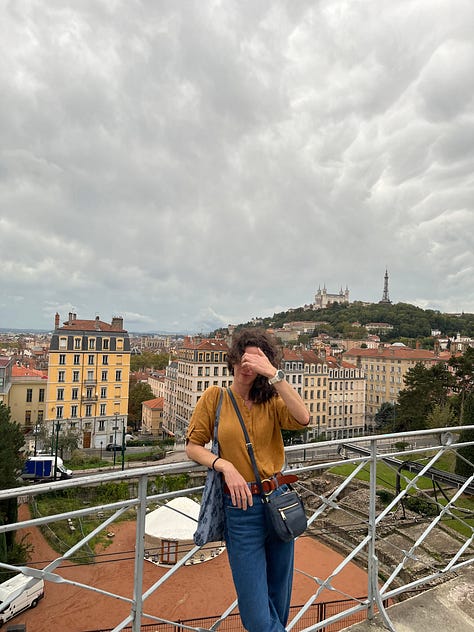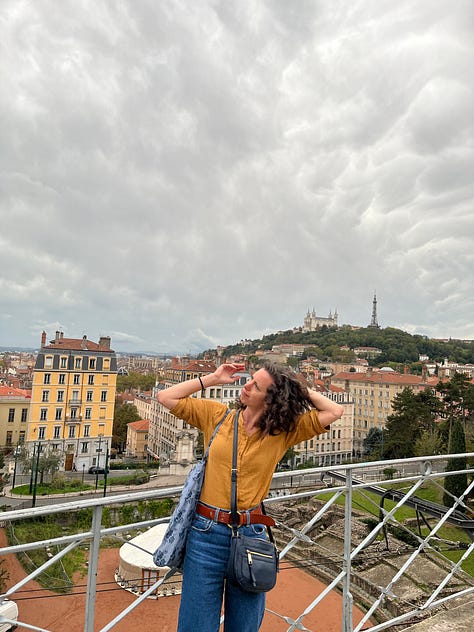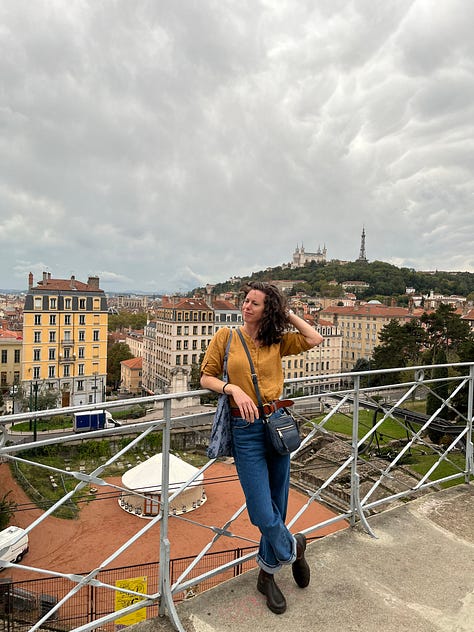august 2021
austin, texas
I like to think that I live in the present. Yann knows it’s because I can’t conjugate verbs in the past tense. When we meet, he patiently listens to me struggle through each sentence, then corrects every other word that comes out of my mouth. Not many men are so lucky.
Yann is my French teacher. We meet once a week via an online language platform. There are hundreds of teachers—from France, Quebec, parts of Africa, even the Caribbean. I found Yann by chance. He has indulgent blue eyes, curly hair just starting to grey, and a straw trilby hat.
Yann lives in Bourges, a city two hours from Paris. When we first met, I excitedly told him about all the places I’ve visited in France: Paris (bien sûr), Nice, et Perpignan. I skied in Chamonix one year for my birthday and spent a summer working on organic farms in the south. I had hoped my symptoms of Francophilia would impress him, but did I happen to learn the language? Non, mon français est encore horrible.
I’ve been trying to learn French for years, and maybe—just maybe—live in France someday. But both of those goals seem far-fetched. I habitually fail to progress past the beginner phase. It’s Sisyphean in nature. Each time I return to French—in middle school, in college, and again some years later—I start from scratch. Je m’appelle Margaret. Je suis américaine. Où sont les toilettes? This time, I hope, will be different.
I spend thirty minutes reviewing flashcards prior to my first lesson with Yann. I’m nervous and fidgety. It’s like showing up to school without having done my homework for the last 20 years. Not being fluent in French feels like a personal failure. I don’t want to disappoint my new teacher. When we at last connect on the video chat, my anxiety dissipates. His warm mannerisms and gentle laugh quickly put me at ease.
Yann has a game he likes to play with new students to assess their knowledge. He shares a board game of illustrated objects on his screen, then rolls a virtual set of dice.
Deux and trois. I’m meant to ask him a question about the music notes in box number cinq.
“Qui est ton chanteur favorite?”*
I think he says Queen. That’s unexpected. I want to know more, but by the time I’ve gathered the words and formed a sentence, he’s already rolled the dice and asked me a question. We carry on like this until, at the end of our call, he asks, “How would you like your lessons to be structured?”
I hadn’t thought about this, so I tell him a bit of reading and writing, but most importantly conversation. I want to converse, to make my world bigger. It’s still the pandemic and I’ve realized that my life prior to lockdown was pretty much the same as it is now. I might as well have been in quarantine for the little that I participated with humans outside my bubble, which consisted almost exclusively of my then-boyfriend.
We’d been together for ten years and by the end of it I’d lost all sense of self. My heart wasn’t broken, but my soul was crushed. For months afterward, I ruminated about everything I’d given up on while we were together. One of those things was learning French.
I’ve decided that pursuing this goal—becoming fluent enough to hold a conversation—won’t just make my bubble bigger, but pop it altogether. When I tell Yann that I want to work on my conversation skills, he quickly responds—almost too quickly— “I don’t think you will be able to have a conversation yet.”
novembre, 2023
lyon, france
Everything hinges on this conversation—on my ability to express myself in French. If I fail, I won’t be able to rent an apartment, signup for a mobile phone plan, or… most importantly… get paid.
I must convince a French banker to open a checking account for me, an American. Due to a monotonous list of IRS regulations, it’s become difficult for Americans to open foreign bank accounts. In preparation for this meeting, I’ve spent hours studying French vocabulary words for banking services.
I’ve been in Lyon for two weeks, having recently secured a one-year work visa. Despite the quagmire of administrative tasks that I must wade through upon arrival, I’ve been enjoying my new city. There are days, while strolling alongside the Saone, or marching up and down the hills of La Croix-Rousse, that I catch myself smiling for no apparent reason. I’m not a needless smiler, and it’s a startling new sensation for me.
When the banker welcomes me into her office and asks me to take a seat, I smile broadly. Then I remember reading that French people think Americans smile too much, so I immediately frown. The banker, Amelie, squinches her nose in confusion.
We exchange pleasantries. So far good. Then she gets down to business.
“Vous avez votre dossier?” She asks.
I pass my binder across the table. It contains every piece of financial documentation I have available. Bank statements, pay stubs, tax returns, work contracts. She reviews each document in silence, occasionally typing something into her computer. I try not to squirm. Here and there she asks me questions, most of which I understand.
Then, “Vous n’avez pas un CDI?”
I was afraid she was going to ask that. Amelie wants to know about my work situation. A CDI is a type of salaried employment in France, and because it’s notoriously difficult to get fired here, it all but guarantees a reliable source of income. I, however, am a freelancer. Reaching across the table, I flip to the primary contract that I secured before leaving the United States.
I inhale, exhale, and begin to speak. I’ve practiced this a million times, but now I can’t tell if the words are coming out right. Amelie grimaces and purses her lips. Her eyebrows raise in horror. Could my pronunciation be causing her physical pain? I try to simplify the scenario as much as possible, highlighting the key points on my CV and again pointing to my work contract.
“Et… voilà,” I conclude.
Amelie stares at me.
I smile.
“Ok,” she says and turns back to her computer.
An hour and a forest-worth of signed paper later, I saunter proudly away from the bank. There was only minor confusion regarding one banking service, but I feel confident that I did everything correctly. Not only did I jump a major hurdle in the immigration process, but I also had a two-hour conversation in French.
Later, I pour a glass of celebratory wine while Yann reviews my bank documents.
“Qu’est-ce que c’est?” He holds up a page indicating a €200 debit from my new account.
I explain that it’s a fee for joining the bank cooperative.
“Non, Margaret.”
“But she said…”
“Are you sure that’s what she said?”
“No… that part of the conversation was kind of hard.”
He points to the words la part sociale on the document. “You’re now the owner of a share in the bank’s capital. Felicitations.”
I repeat this new vocabulary word: la part sociale. “Yeah, I didn’t make a flash card for that.”
In terms of French lessons, that was an expensive one. I set the document aside and take a sip of wine. Outside my window is Lyon, unfolding in a chaos of architectural eras, from Roman amphitheaters to skyscrapers. My bubble, it would seem, has certainly gotten bigger. And popping it is going to get messy.



You don’t have to be a Francophile to dig this newsletter. idiomatic is about curiosity, following your intuition, and living in alignment. Whether that involves moving to France or not. If you’ve read this much of the newsletter, chances are you enjoyed it. Why not do a friend a solid and share it with them?
P.S. If you’re interested in learning French, check out this newsletter.
What I Meant To Say…
* Qui est ton chanteur préféré ?
What happens next?
Keep reading with issue #2.








How do you translate in French:
“Margaret, my new favorite French writer.
Sam
"Could my pronunciation be causing her physical pain?" Yes. The answer is yes.
Italians also wince a lot when I talk. It's part of the fun!!!